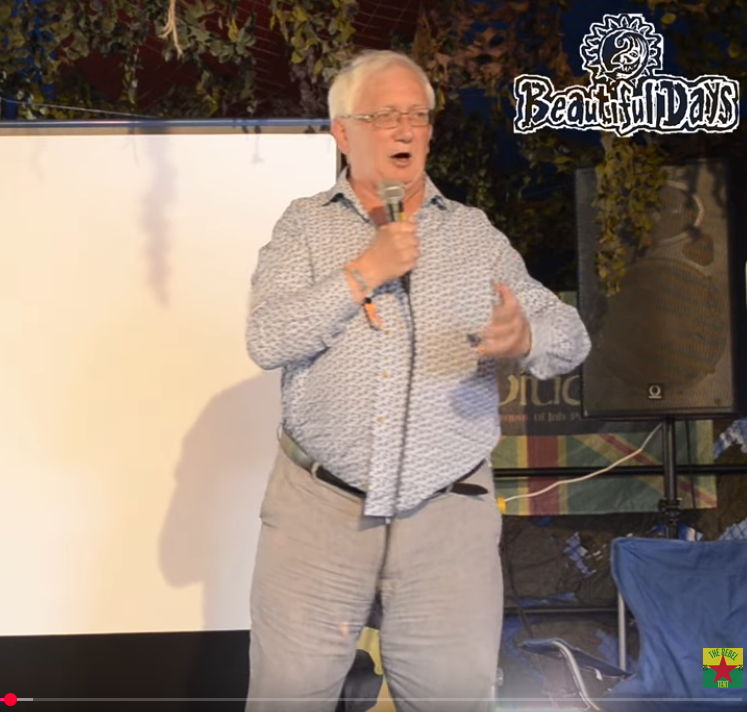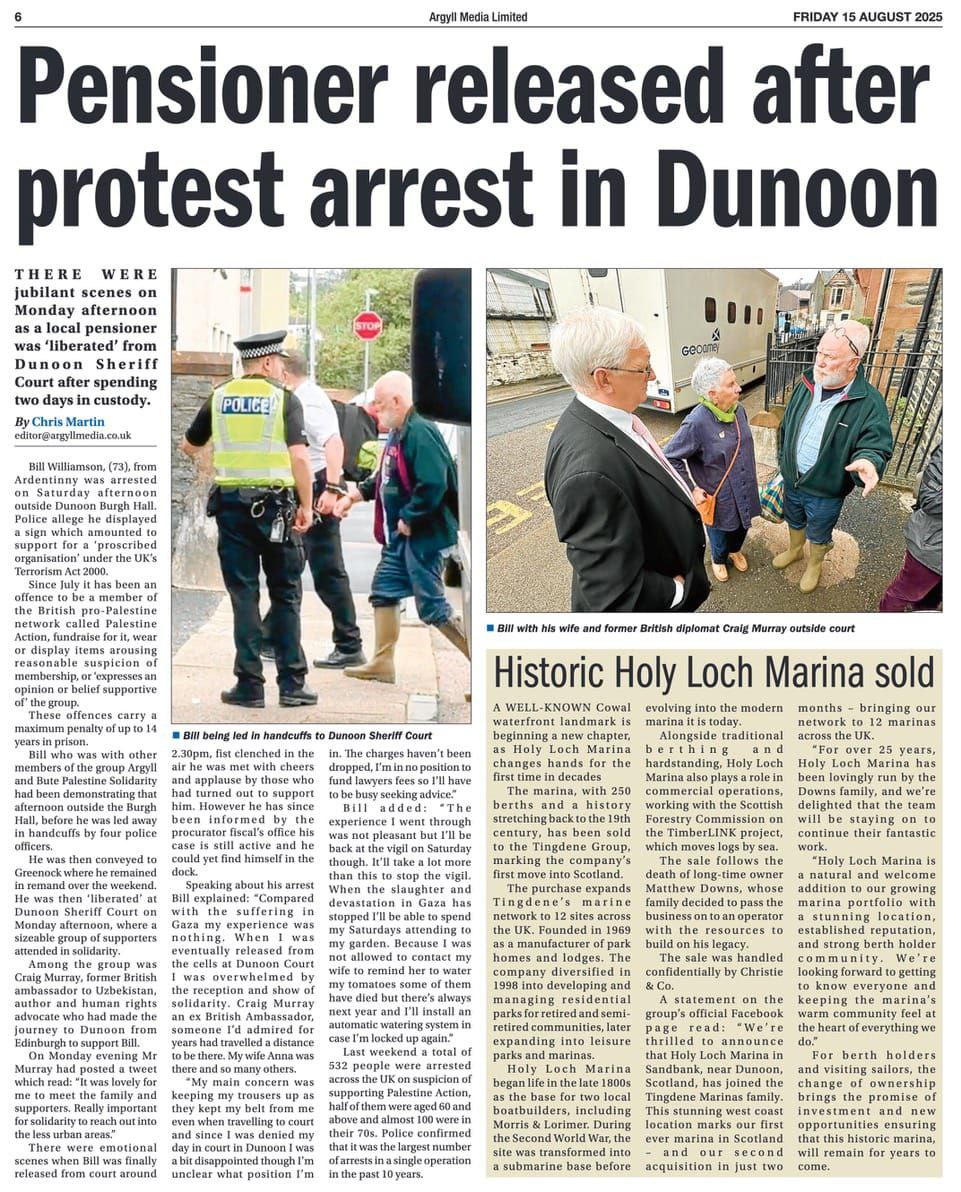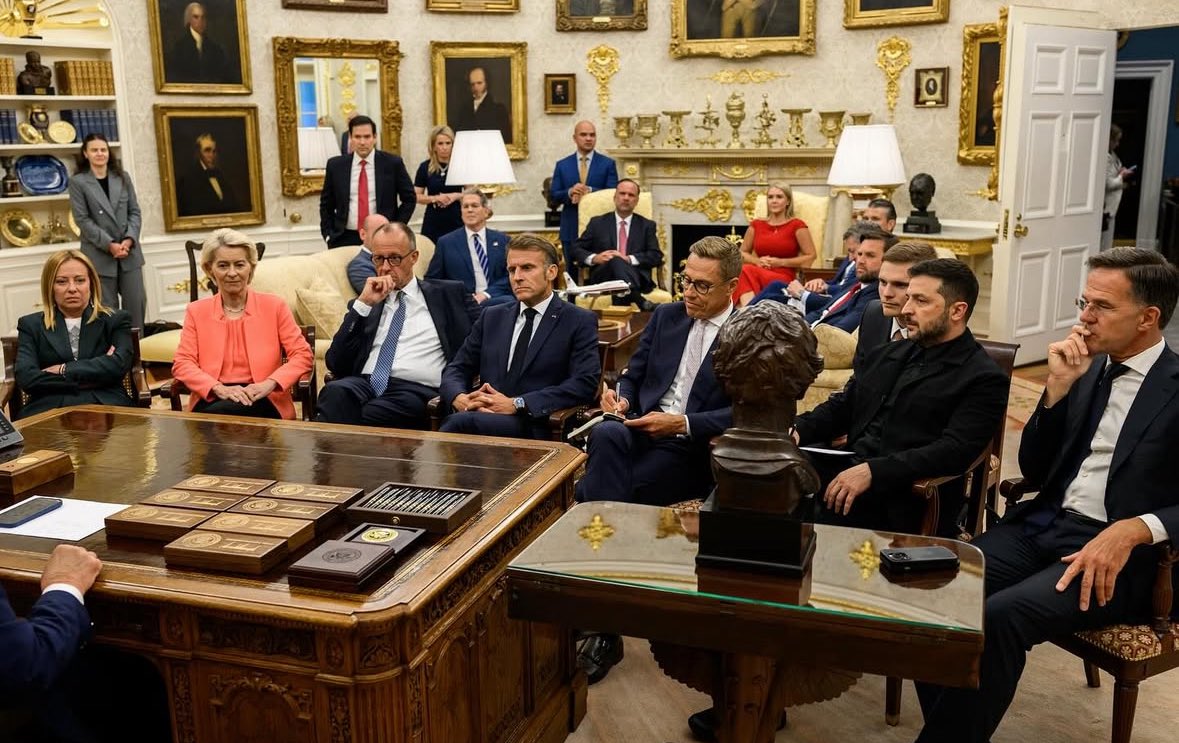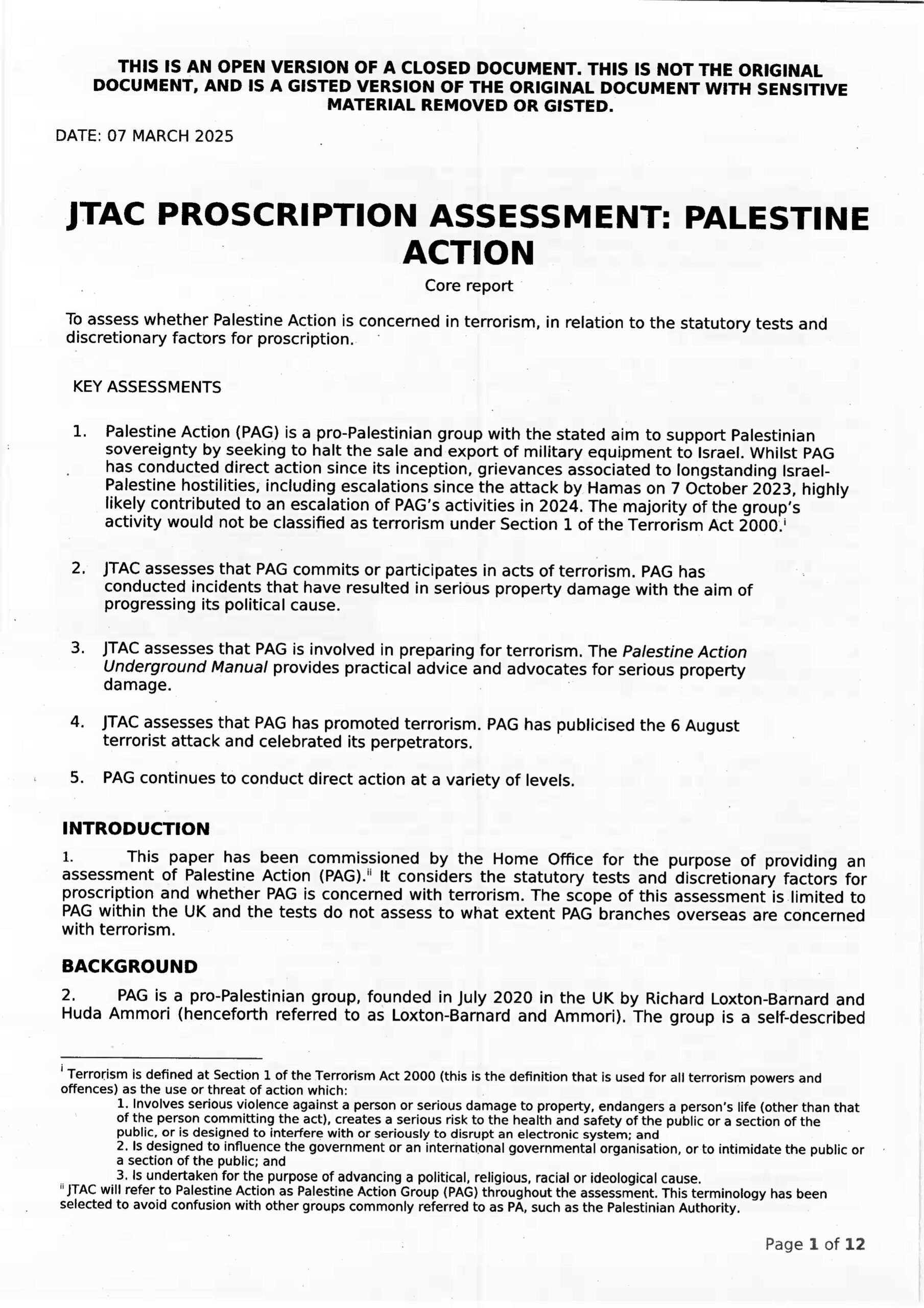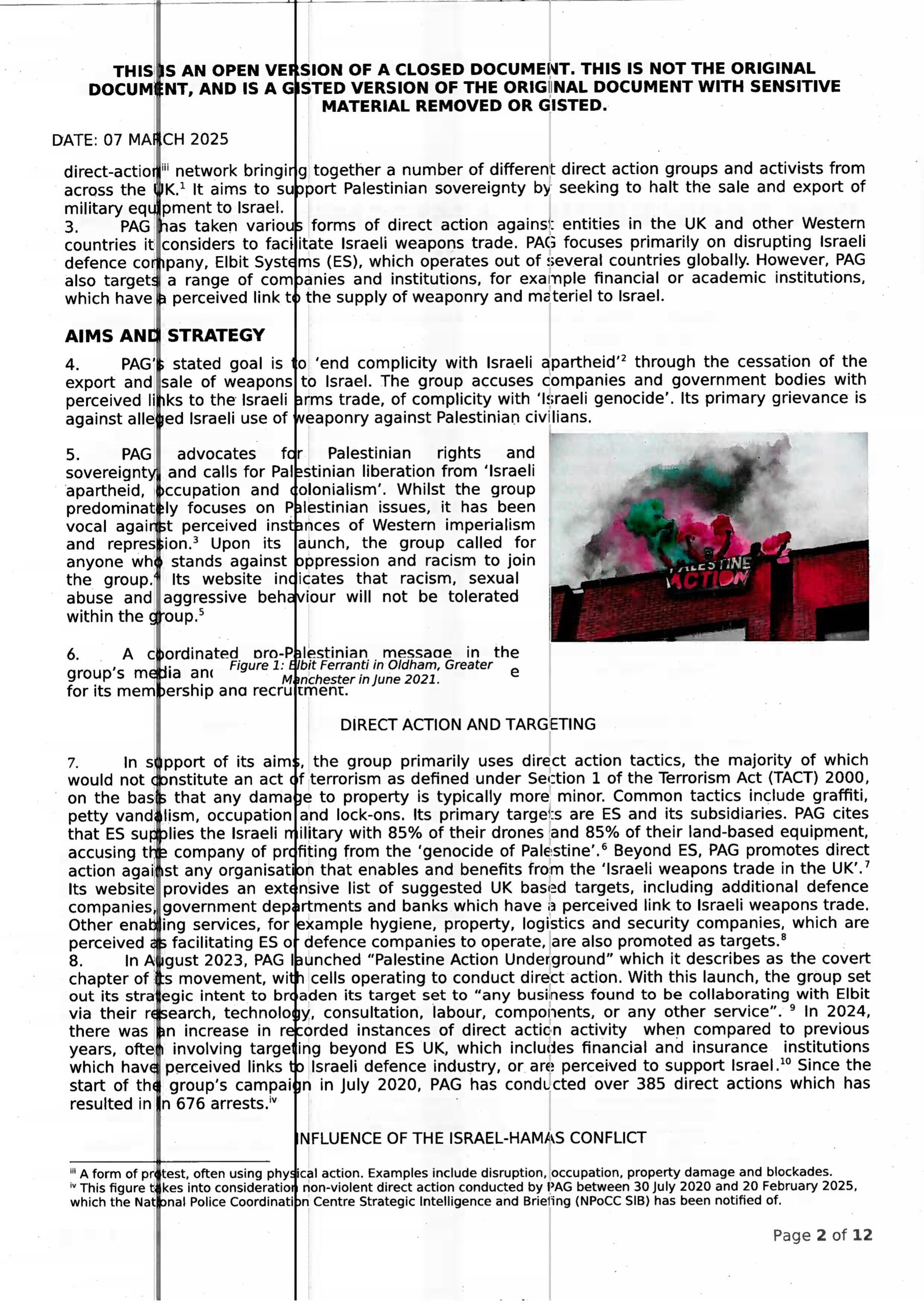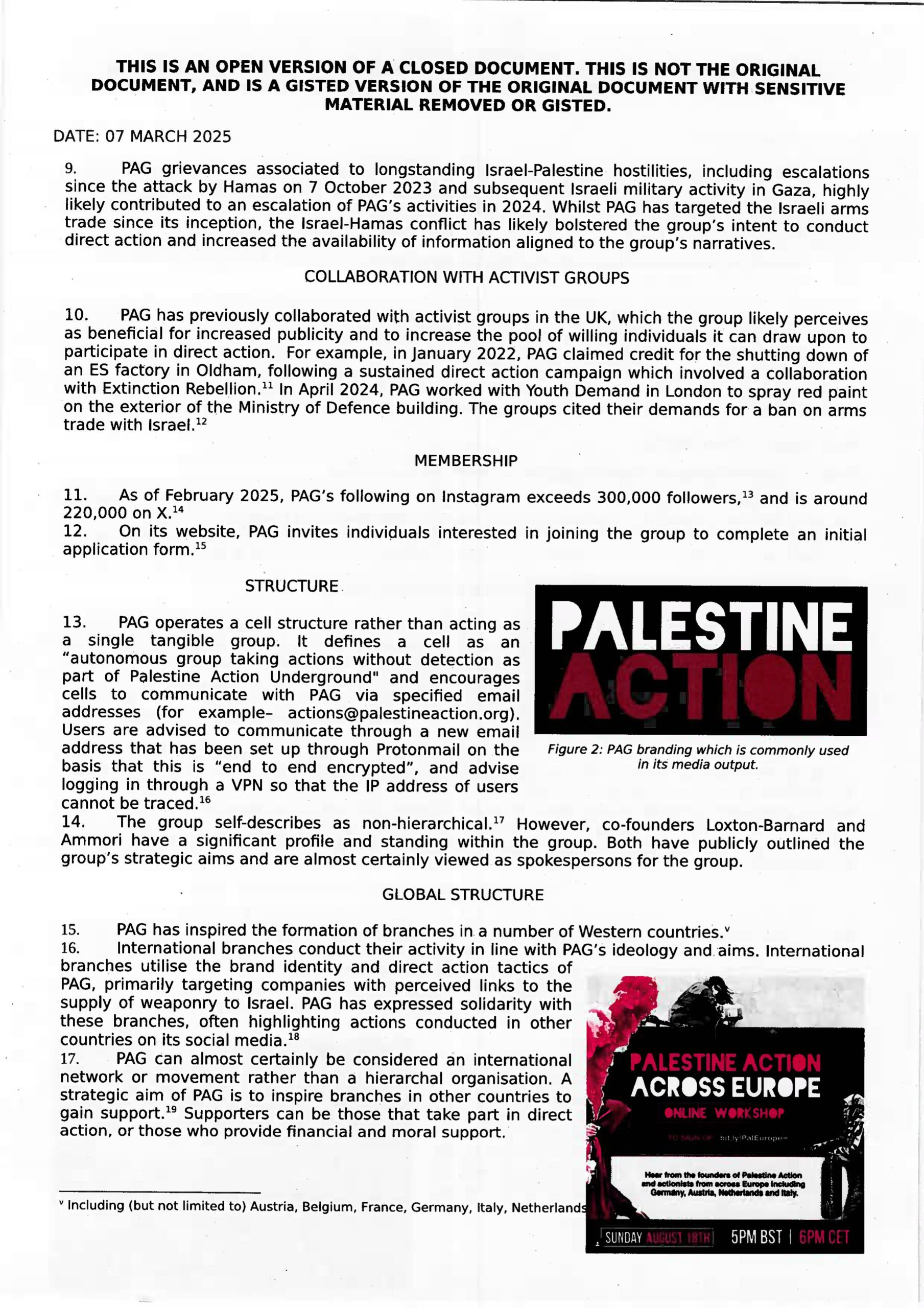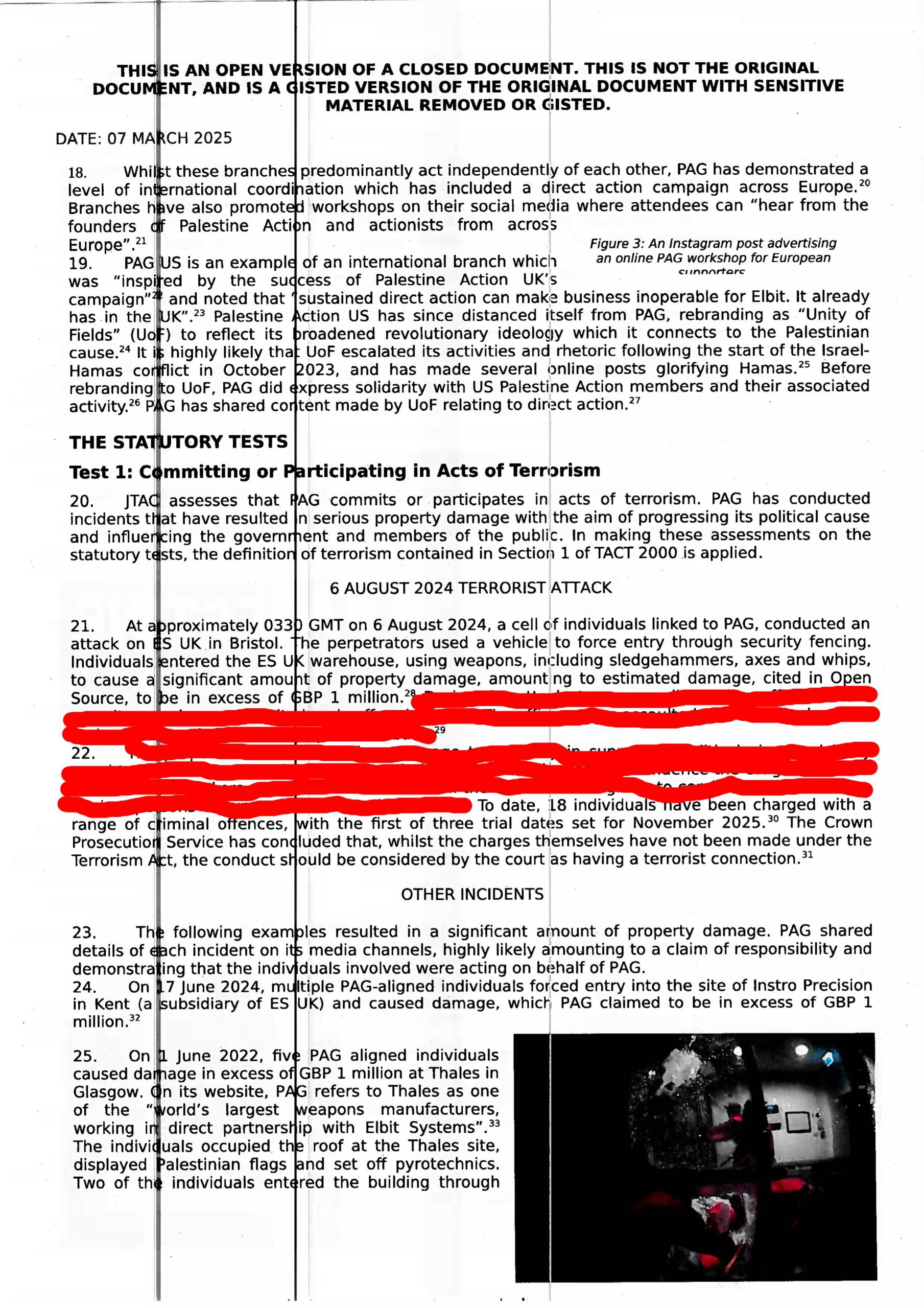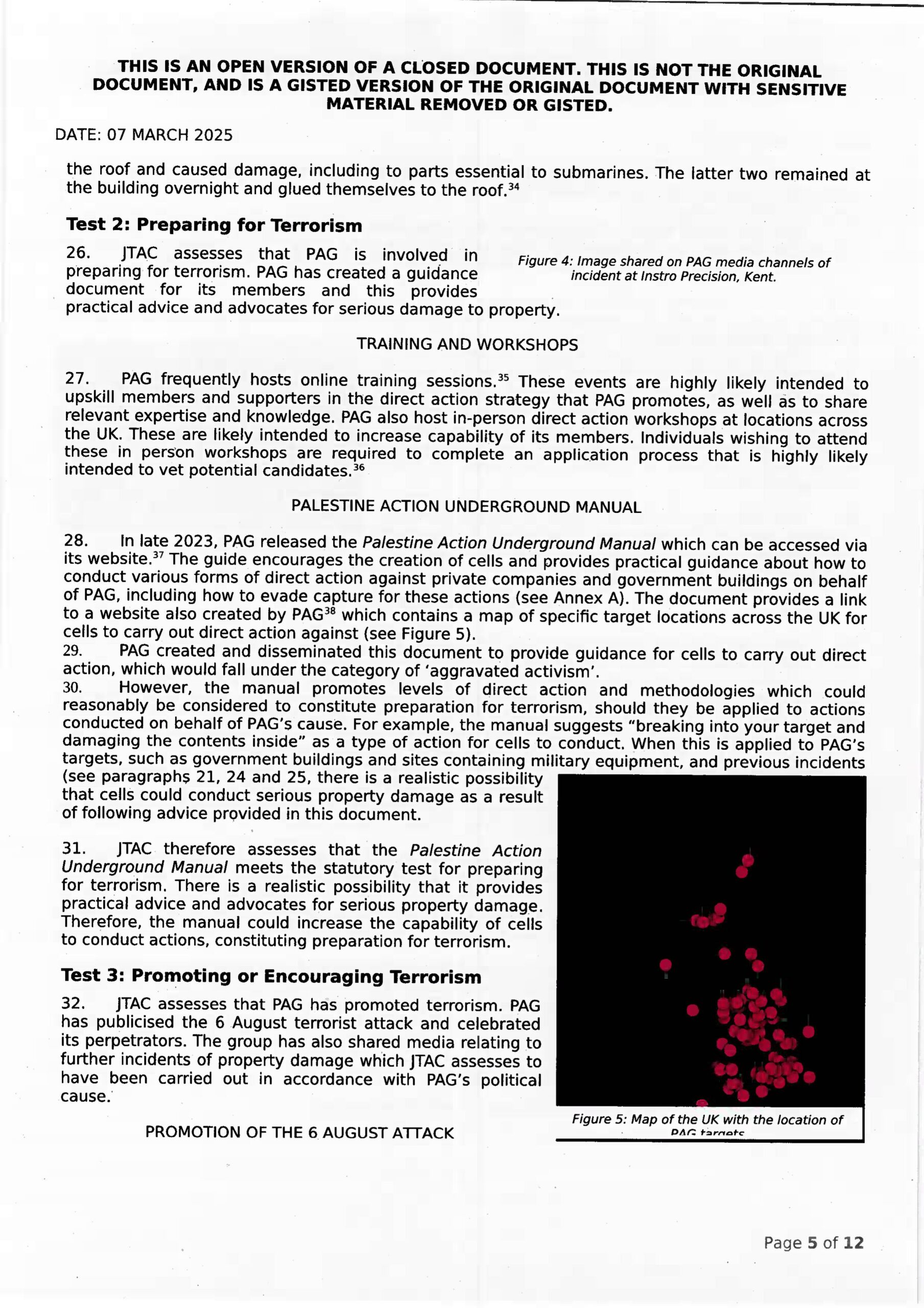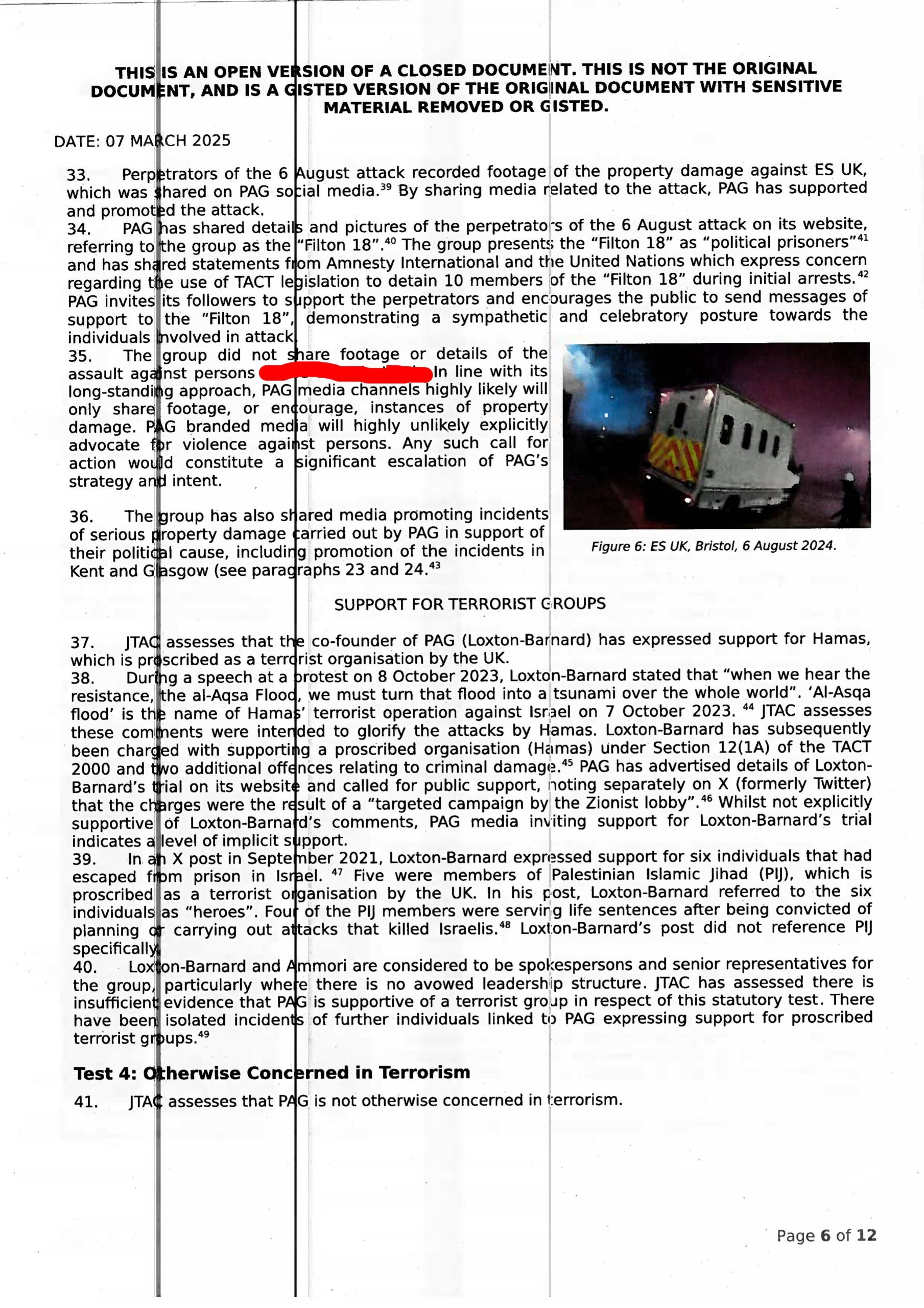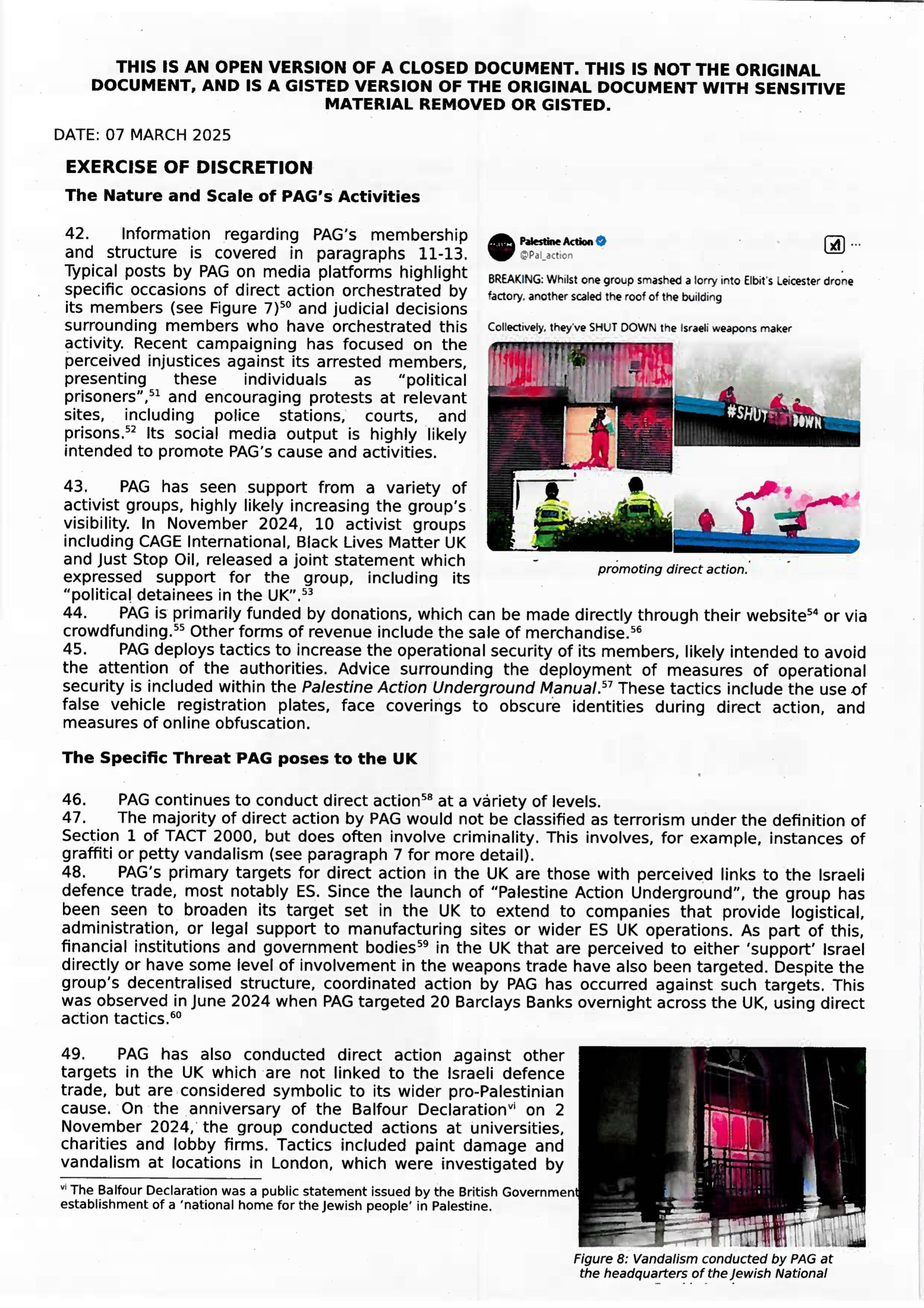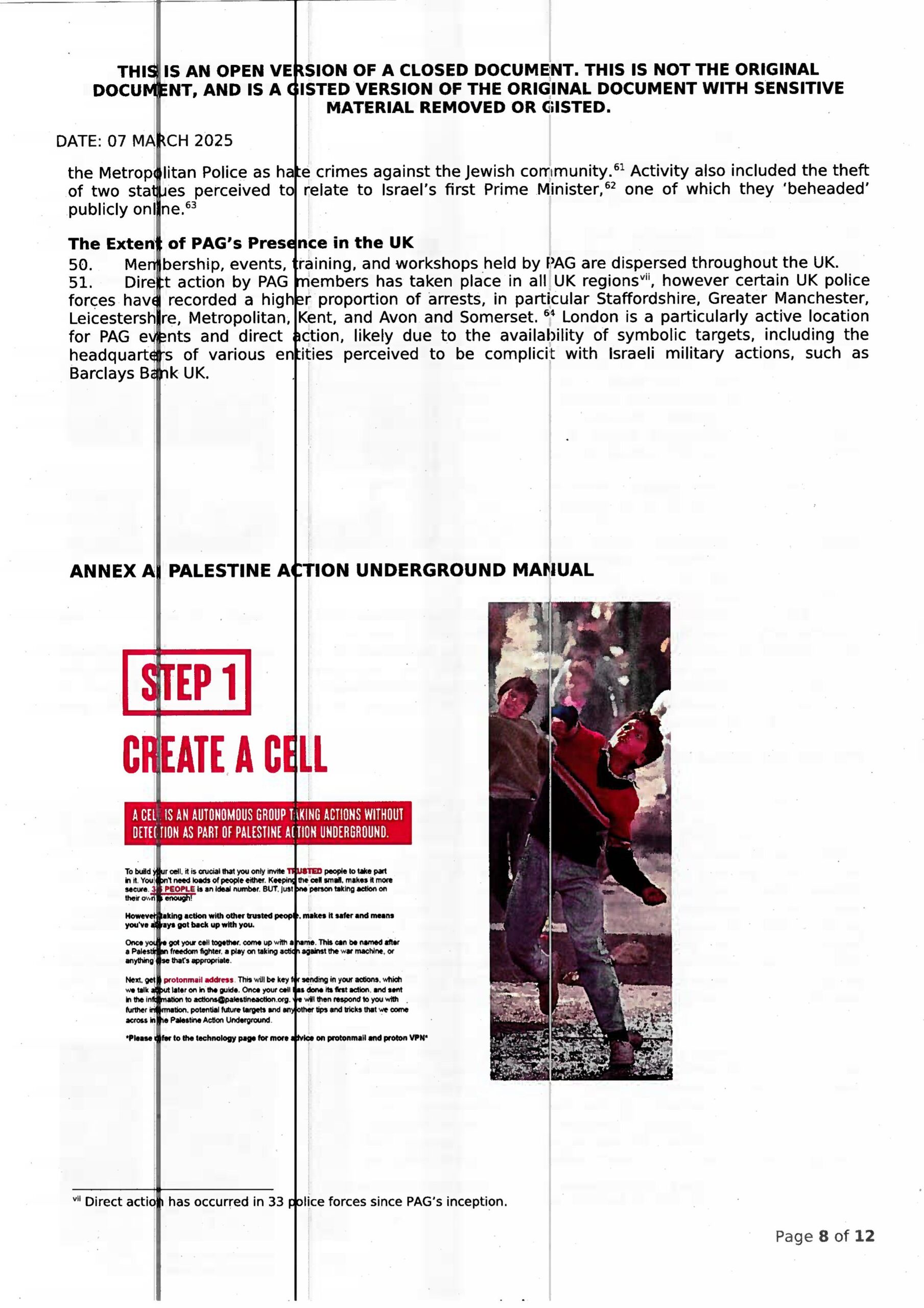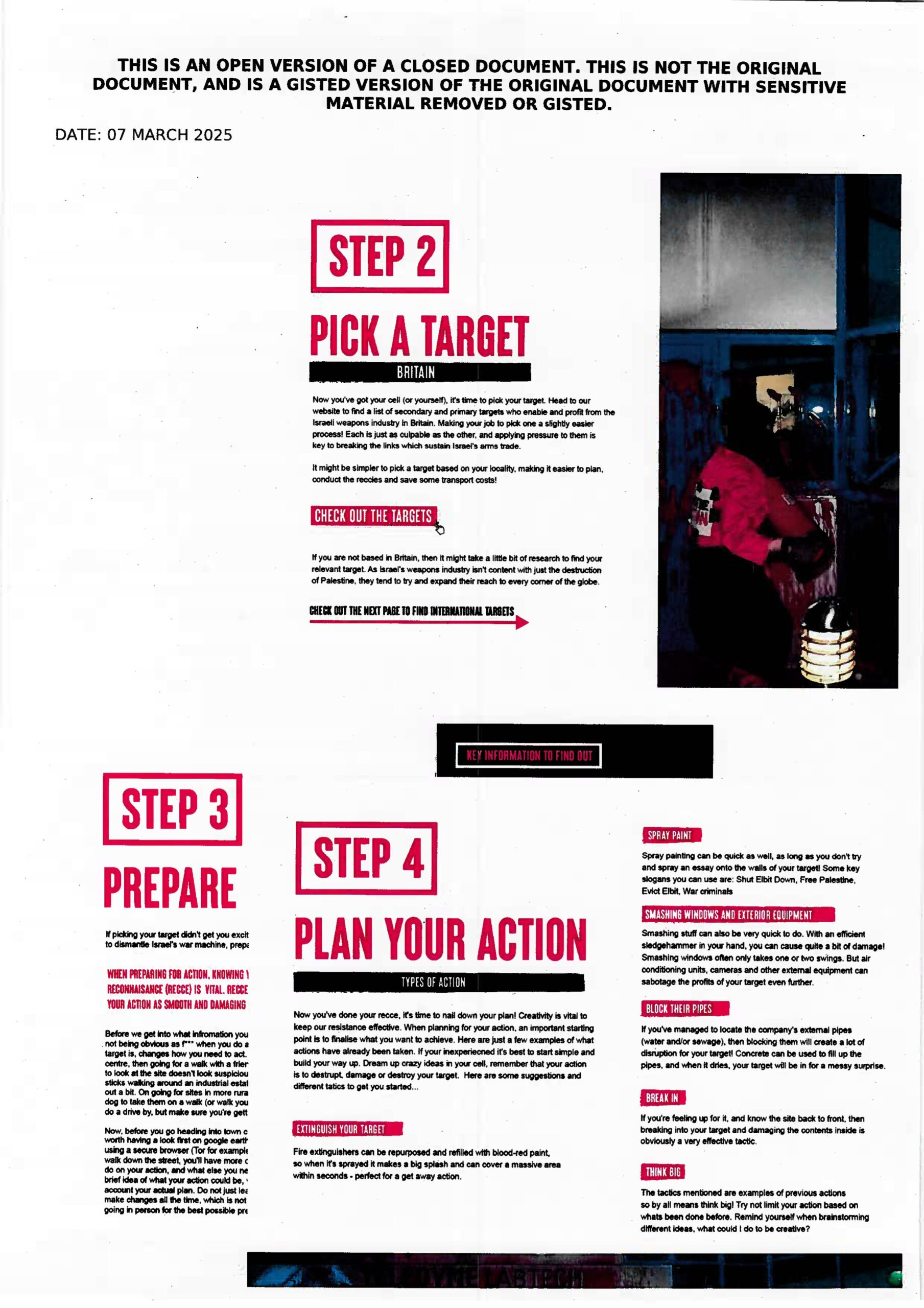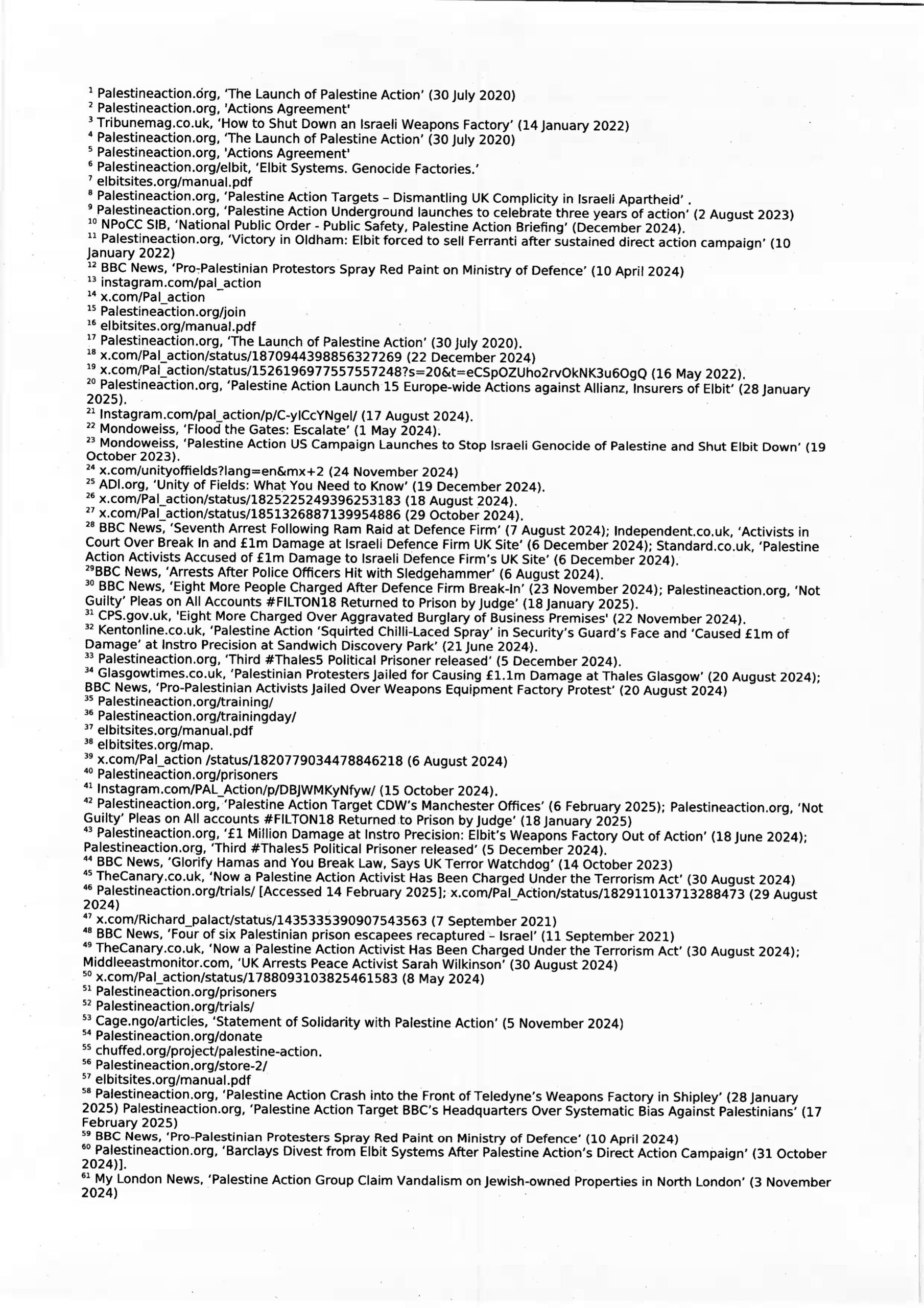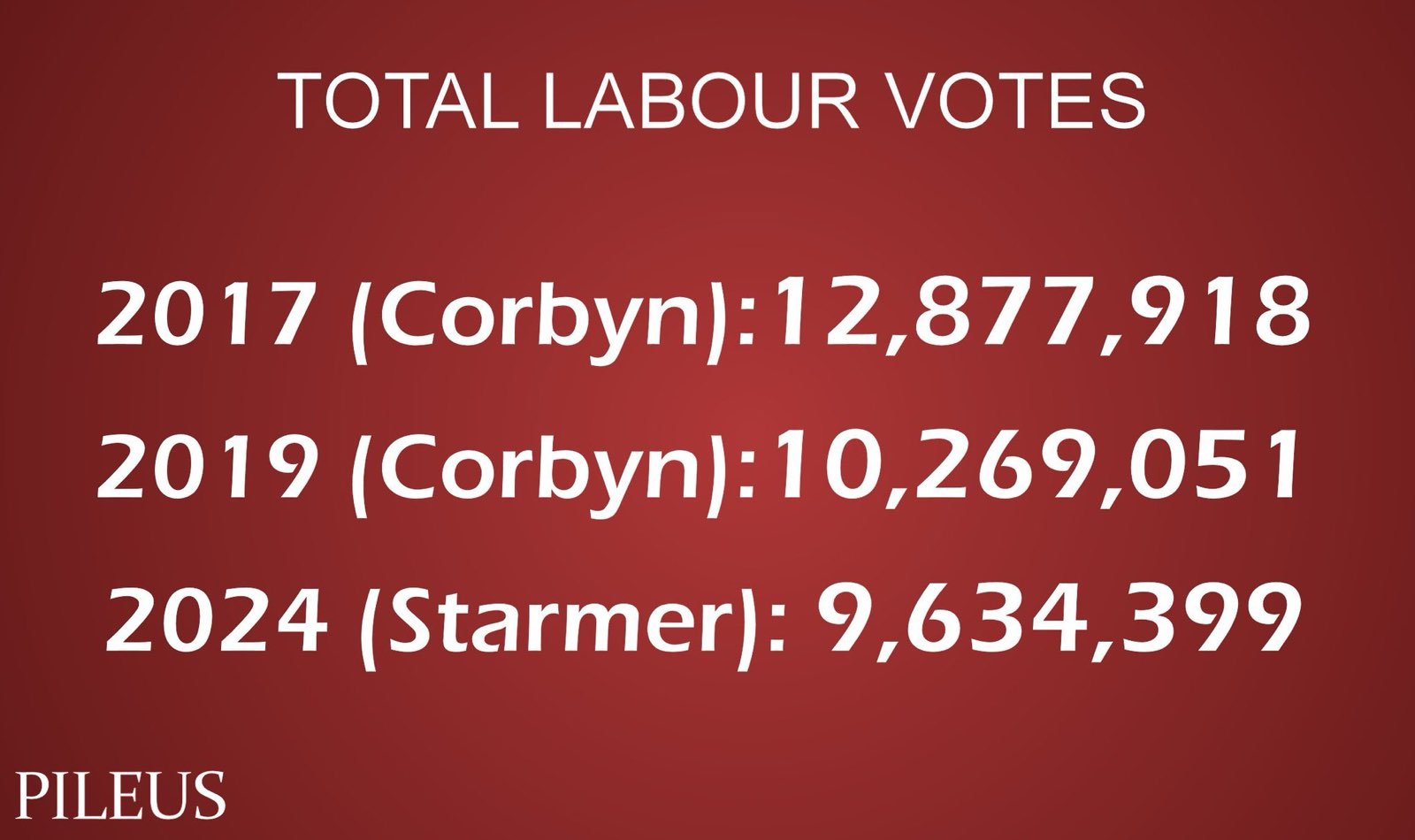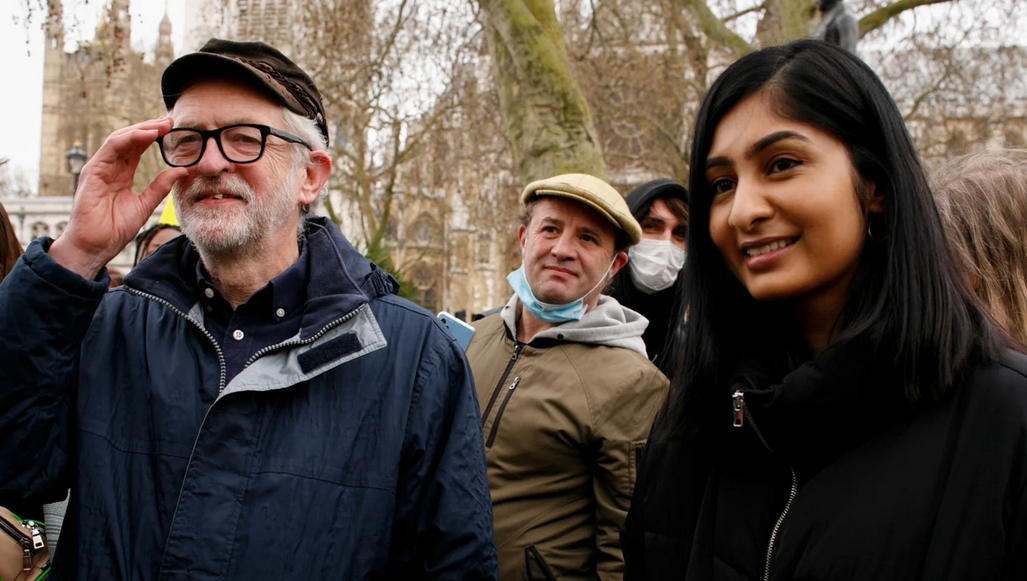On Wednesday we were crammed into the unsalubrious court 73 at the Royal Courts of Justice to hear the judgment from Judge Chamberlain on whether Huda Ammori, co-founder of Palestine Action would be granted a judicial review of the proscription of the organisation.

Judge Chamberlain breezed in and went immediately into a summary of his judgment, beginning with an account of the process so far. This was covered in my last report; the only new information was that the Special Advocate who had been present during the closed session was Tim Buley KC.
In this extraordinary abuse of process, the security services are allowed to bring alleged “intelligence” material into proceedings, which Huda Ammori and Palestine Action are not permitted to see. Nor are their lawyers allowed to have any idea what allegations have been made.
Instead a court-appointed “Special Advocate” is supposed to represent their interests, without being allowed to tell them what the accusations are. Nor can they tell the special advocate what points to make, as in “we absolutely have no foreign funding and have never had any contact with any foreign intelligence agencies”.
Nobody is ever allowed to know what a “Special Advocate” actually does or says in the closed session, nor what the government lawyers or those giving evidence on behalf of the security services do or say.
If I were a Special Advocate, I would do nothing except hand the judge a copy of the Dossier on Iraqi Weapons of Mass Destruction, and say: “This shows the quality of security service intelligence. Now go and wipe your arse with it.”
Having told us there had been a closed evidence process, Judge Chamberlain then gave us what he said would be a brief summary of his judgment. The link is to the full judgment.
Chamberlain said that the claimant (Huda Ammori) had introduced evidence of police action against people expressing in various ways support for the Palestinian cause. There was also evidence of people deliberately breaking the law on support for proscribed organisations.
The Home Secretary had submitted that the correct route for an appeal against proscription was to POAC (the Proscribed Organisations Appeals Commission). The Claimant had responded that this would take too long, until June 2026 at the earliest.
There were five reasons that POAC might not be a viable alternative remedy to a judicial review:
1) Timing – the POAC process could not conclude before mid-2026.
2) The impact on freedom of expression and assembly while the proscription remained in force.
3) There would be numerous criminal proceedings over support for Palestine Action in magistrates’ courts and crown courts up and down the country, in each of which it might be argued that the proscription was itself unlawful. There was a danger of conflicting judgments in different localities.
4) The legislation did not specify that an appeal against proscription could only be through POAC.
5) A judicial review did not close off an eventual process through POAC.
In assessing that a judicial review was a permissible route, he had declined to follow the judgment over the Kurdish Workers’ Party, because new court procedures (the Special Advocate nonsense) now permitted the courts to handle intelligence material, which they did not at the time of that case. Plus, that judgment was plainly wrong.
This was stated with such offhand disdain as to be striking. Of course judges can differ, but the bland contempt of the phrasing and delivery were unusual: “plainly wrong” to a judge of equal standing.
Which brings me to the unavoidable question of Chamberlain’s demeanour.
Sometimes my powers as a writer are not equal to the occasion. I have never seen anybody quite as self-satisfied as Chamberlain; he radiates assurance. He is the walking antithesis of impostor syndrome. It is worse than smug: there is a palpable gloat about him.
Judges in the Royal Courts are seated on an imposing tiered dais, many feet above the courtroom. Some judges attempt to diminish the distance; this can come over in different ways, from condescension to chumminess to intellectual equality.
Chamberlain does not bother. He is quite happy that our only view of him is up his nostrils.
He rattled through the grounds of appeal which the claimant had put forward.
Ground 1: Chamberlain was satisfied that Yvette Cooper had not acted for an improper political purpose but in the interests of national security.
Ground 2: That the proscription was a disproportionate limitation on freedom of expression was reasonably arguable.
Ground 3: It was not arguable that Palestine Action did not commit acts intended to influence the government, or that those who did were insufficiently connected to the organisation.
Ground 4: It was not arguable that Cooper had failed to consider significant information about Palestine Action or its classes of supporters.
Ground 5: Cooper did not err in giving weight to the views of Israel, to questions of financial loss and to other stated factors in concluding terrorism.
Ground 6: That Cooper failed to give weight to the need to oppose Genocide – this could be wrapped up in the balance question of disproportionate action under Ground 2.
Ground 7: The fact that only 3 of 387 actions were deemed by JTAC (the government’s Joint Terrorism Analysis Centre) to be terrorist – this could also be wrapped up in the proportionality exercise under Ground 2.
Ground 8: That Cooper had failed to consult those affected by the proscription under her common law duty; including not consulting with Palestine Action nor with any pro-Palestinian group or individual, when she did consult with the Israeli Embassy, weapons manufacturers and others. This was a reasonably arguable point of law.
Ground 9: That Cooper had ignored her obligations to prevent discrimination under the Equalities Act by targeting a pro-Palestinian protest movement – this was not arguable.
So Chamberlain concluded that a judicial appeal was granted under Grounds 2 and 8 but dismissed on all other grounds. However, as you will have gathered, he had in effect accepted that Grounds 6 and 7 were also arguable points, but they could be taken as part of Ground 2.
Chamberlain then suggested to Raza Husain, lead KC for Huda Ammori, that he suspected he would wish to seek interim relief and expedition of the case. Raza Husain stood and said the claimant wished to request interim relief, which would suspend the proscription pending the judicial review.
Chamberlain did not answer, but he paused the court while printed copies of his judgment were handed round to the media.
Raza Husain then tried again, but Chamberlain first turned to discussion about when the judicial appeal might be heard. Ben Watson, KC for the Home Secretary, wanted a longer period for disclosure and was adamant that the process could not start until some security services-related event on 12 September, which could not be discussed in open court.
This key event and date were referred to frequently in hushed tones. Hackers and foreign spy agencies please take note: 12 September. Raza Husain pressed for the hearing to be as soon as possible. Chamberlain pointed out that the dangers of haste “cut both ways” – full disclosure was also in the interests of the client.
This was pretty ironic, as the key “intelligence” on which the case turns is never disclosed at all.
Ben Watson KC then said the Secretary of State wished to appeal the decision to grant judicial review. Chamberlain replied that could wait, as he did not wish to go into closed court at the moment.
Raza Husain then stood and said again that the claimant wished to renew the application for interim relief – with great patience and as though he had not said it four times already.
Chamberlain said he had expected this, as though it were the most tiresome thing in the world.
He then ignored Raza and said that he had decided to grant permission to intervene in the case to Professor Ben Saul, the UN Special Rapporteur “on the promotion and protection of human rights and fundamental freedoms while countering terrorism”.
Raza Husain noted this and then said the claimant wished to apply for interim relief.
Chamberlain was somewhere else. He said that Professor Saul’s expertise would obviously be welcome, but the permission to intervene did not mean he could guarantee any particular time slot or consideration, which would be up to the court hearing the judicial review “which may or may not be me”.
My handwritten notes have a marginal entry that this was the 6th time Chamberlain had interrupted the application for interim relief. Finally Raza Husain got to embark on it.
Since the first request for interim relief a fortnight ago, over 1,000 more Palestinians had been killed in Gaza. 80 children had been starved to death. The UN High Commissioner for Human Rights, Volker Turk, had made a detailed statement criticising the proscription of Palestine Action and specifically asking for it to be revoked.
Chamberlain asked what precisely he was seeking in law. Raza Husain replied it was a stay of Article 2 of the Order, the proscription of Palestine Action.
Chamberlain said that his previous judgment against an interim stay had already accepted there was a serious issue to be heard, on the effect upon freedom of speech. But that was insufficient reason for a stay.
Raza Husain said that Ground 8, which was now accepted, was extremely important. It was a very strong argument, so strongly based as to justify the suspension of a proscription not done by due process.
Chamberlain replied that he had already noted there may be an arguable case on grounds 4 to 8, in his judgment against an interim stay. The Court of Appeal had agreed with him against the interim stay.
Raza Husain then handed over to Blinne Ní Ghrálaigh KC who said people were being deprived of freedom of expression protections under Article X of the European Convention on Human Rights. The chilling effect was on thousands of people.
Chamberlain said that may be true, but there could be irreparable harm on both sides. He had to consider the harm that might be done to national security by the suspension of the proscription order for several months.
Blinne responded that it was ridiculous, on grounds of alleged national security, to arrest elderly people for holding a placard, keeping them incommunicado as terrorists and going through their property with swabs.
Chamberlain replied that the argument is that such action is necessary to suppress the organisation as a whole.
Blinne asked whether proscription is actually necessary to protect the national interest, as opposed to the large number of other legal remedies available to the Secretary of State?
There were three kinds of freedom of speech affected. These were… Chamberlain then cut her off, saying he had identified these as speech which was legal in support of Palestine, speech which was deliberately defying the law, and speech which fell in a grey area of interpretation.
This was one of many interruptions by Chamberlain who made very plain that he was not interested in hearing this argument again. Blinne appeared to be continually apologising for her own existence: “I don’t want to push this too far”, “I will only lightly touch upon it”, “I won’t take up much time”.
What she was really saying was: “I can see you are not in the slightest bit interested in listening to me”. And she was right.
But she gamely ploughed on. Blinne said that people making perfectly legal expressions of support for Palestine were being harassed by police owing to the proscription, and the grey area appeared to include people who were opposing the proscription of Palestine Action.
There was also a fourth category: the press. There was much evidence of a chilling effect of the proscription on what journalists felt able to write about Palestine, as shown in evidence submitted by John McEvoy and others.
Furthermore the situation was made worse by section 12.1.a of the Terrorism Act which specifically removed the need for intent in criminalised speech. Accidentally saying something taken to be supportive of Palestine Action could be an offence.
Chamberlain said that was for the police and the courts to deal with.
Blinne said it should not fall on the police and courts to make such judgments and it should not fall on ordinary members of the public to try and predict an invisible line they should not cross following the first ever proscription of a non-violent protest group.
People had been arrested for holding signs saying “I oppose genocide. I support Palestine Action.” That is not speech that threatens the security of the UK nor the safety of the public.
Raza Husain now took over again. He noted that the disclosure documents from the Home Office specifically stated that national security was not the “driving factor” for the proscription. They also specifically stated there was no damage to national infrastructure, nor any impact on national defence. The “attack” on Brize Norton was an act of vandalism which the Home Office documents disclosed would not affect the operation of aircraft painted.
This was fascinating. Plainly the Home Office internal documents show that what Yvette Cooper has been saying to Parliament and putting into the media is a lie.
Husain went on that the disclosure documents indicated that the timing of the proscription depended on factors including the local elections, a criminal trial, Israeli breaches of a ceasefire agreement, and a religious holiday.
That the proscription remaining in force is critical to national security is plainly therefore a nonsense, said Husain. At this point, Chamberlain interrupted him again.
My handwritten note only says “Chamberlain supercilious”. It had been obvious that Chamberlain had no interest in the arguments for interim relief. He had ruled on that two weeks ago, and as he is infallible, this was all a waste of time.
He did not actually say “talk to the hand” but his body language could not be more obvious. Occasionally he would relieve the ennui by interrupting Raza or Blinne mid-sentence.
Judge Chamberlain has never heard a sentence spoken that could not be improved by an interjection from Judge Chamberlain. Being a generous man, he declines ever to deprive the world of his great wisdom or make people suffer by listening to the uninterrupted thoughts of mere lawyers.
The effect of this is that we frequently can only surmise what the argument was going to be before it was intercepted and corrected. Chamberlain’s ability to predict what somebody was going to say and replace it with something more clever instead is uncanny – at least in his own estimation.
I do recall what Chamberlain said that caused me to write “Chamberlain supercilious”. He said that he supposed that Mr Husain would tell him that an interim stay was necessary and that Mr Watson would argue that it was dangerous.
Raza Husain was plainly annoyed. It is not just that I will say there should be a stay and Mr Watson will say the opposite, he said. It is the reasons which are important. He then continued to try to make progress, and was plainly angered by another interjection by Chamberlain.
“That’s not what I said”, Husain stated, plainly furious at being misrepresented. “That’s not what I said”, he repeated. Shortly after, he drew to a close.
Ben Watson KC for the Home Secretary had nothing to say in public that would defend the need for the proscription to continue in force. His argument both against the interim stay, and for the right to appeal against the granting of judicial review, was entirely based on secret intelligence. We therefore had to clear the court.
I don’t know what Chamberlain heard in private from the intelligence services. I should be very surprised if it was not about invented support for Palestine Action from Iran or fabricated plans to attack the Israeli Embassy, because that is precisely the kind of mendacity that Ken McCallum, Director General of MI5, considers it his patriotic duty to churn out on a daily basis.
As I waited in the corridor for court to resume, there was a rather touching moment. A Muslim patriarch with a most impressive white beard came out from the adjacent courtroom at the conclusion of another, unrelated case. He was followed by his large family.
He recognised me, shook my hand and stated “We are 100% with you, all of us. Let me know if there is anything we can do.” Turning round and gesturing to his family, he asked “Would you like us to stay here and support you now?”
I thanked him genuinely but declined, as there was absolutely no space in the courtroom. But I record it because little moments like that can keep us going in these difficult times. I was genuinely touched.
After 45 minutes of secret spook-fest inside the courtroom, honest people were allowed back in. Chamberlain then produced his decisions.
To overturn his judgment of 4 July not to grant interim relief from proscription, there would have to be a material change of circumstances in the interim. Three grounds had been advanced:
1) That he had granted permission on ground 8, which the claimant stated was especially strong. But this was not a material change as he had stated before that grounds 4 to 8 might be arguable.
2) The extent of interference with freedom of speech. But this was not a material change as he had noted the interference with freedom of speech at para 100 of his original judgment. All that had happened was that possibilities he had foreseen had turned into concrete fact.
3) That the Secretary of State had given no evidence of threat to the public. But this was not a change since 4 July.
So, said Chamberlain, there was no material change of circumstance and the request for interim relief was denied.
The Secretary of State’s application for Permission to Appeal was also dismissed. Watson would have to apply direct to the Court of Appeal.
Finally, the judicial review could not be further expedited and would have to be held in a convenient week after 10 November.
With that, the hearing concluded.
My immediate feeling was outrage at the chutzpah of Chamberlain in claiming that he had predicted the effects of the proscription on freedom of speech, when the exact opposite is true – he pooh-poohed them. He did indeed state at para 100 of his 4 July judgment:
The evidence I have seen established that the broad criminal prohibitions imposed by the 2000 Act, and the very long sentences potentially available for breach of them, can cast a long shadow over freedom of speech. This, however, is the inherent consequence of a regime which aims to disrupt and disable organisations which meet the threshold for proscription.
But that paragraph only refers specifically to people protesting
under the banner of PA
Chamberlain in fact entirely rubbished the notion that people protesting more generally on Palestine would be affected. He stated explicitly in para 96 that:
In my judgment some of the consequences feared by the claimant and others who have given evidence are overstated.
And in para 97 Chamberlain got wrong everything that was going to happen next. He states that it will remain lawful:
… to continue to express their opposition to Israel’s actions in Gaza and elsewhere, including by drawing attention to what they regard as Israel’s genocide… They will remain free to do so in private conversations, in print, on social media and at protests.
Yet Chamberlain had now been given evidence that the police were in fact, since the proscription, persecuting people for precisely the activities he had said would still be allowed.
What is more, in the 19 July hearing for a judicial appeal, Chamberlain had actually accepted that he got this wrong in his 4 July decision on interim relief. Here are extracts from the report of that hearing by Mohamed Elmaazi for this blog:
“I think what you’re doing is, you’re saying, you predicted this,” Mr Justice Chamberlain told Blinne Ní Ghrálaigh KC – representing Palestine Action co-founder Huda Ammori the morning of 21 July at the High Court of Justice – “and what you’re doing now is sharing evidence that they have happened.”
The judge’s remarks were in response to Ghrálaigh describing example after disturbing example of pro-Palestine and anti-genocide protesters being threatened with arrest — or actually arrested – across the country, ever since Palestine Action was banned as a terrorist organisation.
…Two weeks later, Chamberlain’s tone was somewhat modified. He appeared to accept that he may have been wrong. In fact, he actually reminded the parties of what he wrote by reading out part of his decision refusing permission.
Ghrálaigh told the court that the situation is “even worse” than even they had predicted.
So how did Chamberlain go from openly accepting that on 4 July he got this wrong, to claiming that there had been no material change as he foresaw everything correctly on 4 July?
The answer of course lies in those secret sessions with the security services.
To connect all this back into what is really happening on the streets, the police this evening detained hundreds of people in London, as they aggressively broke up a pro-Palestinian demonstration.
So while the granting of a judicial review represents some kind of victory, it is meaningless for now, as both the proscription and the repression continue – as does the Genocide.
I do not have any hope for success from the judicial review – all this is part of the smoke and mirrors of process and legality behind which the British Establishment seek to mask their complicity in the crimes of Zionism.
———————————
My reporting and advocacy work has no source of finance at all other than your contributions to keep us going. We get nothing from any state nor any billionaire.
Anybody is welcome to republish and reuse, including in translation.
Because some people wish an alternative to PayPal, I have set up new methods of payment including a Patreon account and a Substack account if you wish to subscribe that way. The content will be the same as you get on this blog. Substack has the advantage of overcoming social media suppression by emailing you direct every time I post. You can if you wish subscribe free to Substack and use the email notifications as a trigger to come for this blog and read the articles for free. I am determined to maintain free access for those who cannot afford a subscription.
Click HERE TO DONATE if you do not see the Donate button above
Subscriptions to keep this blog going are gratefully received.
Choose subscription amount from dropdown box:
PayPal address for one-off donations: [email protected]
Alternatively by bank transfer or standing order:
Account name
MURRAY CJ
Account number 3 2 1 5 0 9 6 2
Sort code 6 0 – 4 0 – 0 5
IBAN GB98NWBK60400532150962
BIC NWBKGB2L
Bank address NatWest, PO Box 414, 38 Strand, London, WC2H 5JB
Bitcoin: bc1q3sdm60rshynxtvfnkhhqjn83vk3e3nyw78cjx9
Ethereum/ERC-20: 0x764a6054783e86C321Cb8208442477d24834861a
